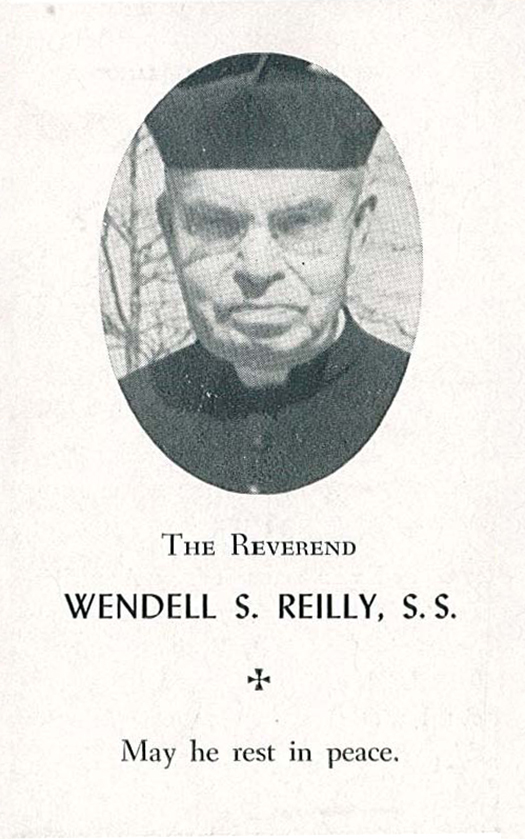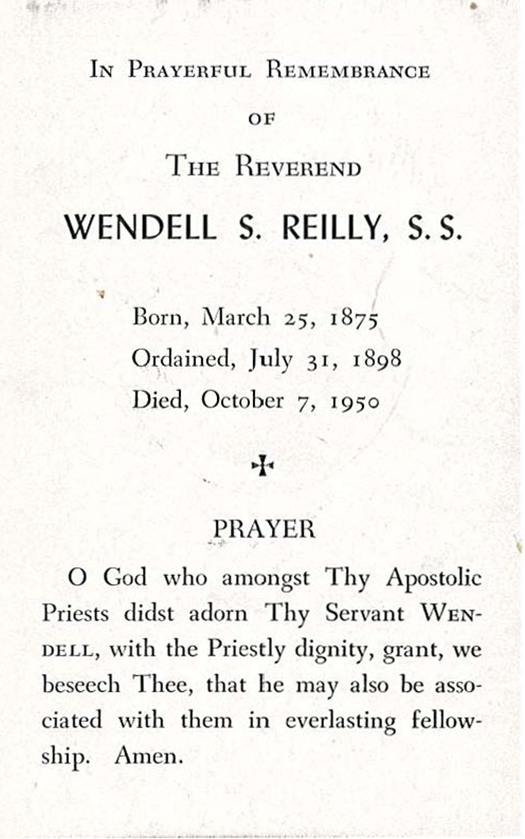Reilly, Father W. Stephen
1950, October 7
Date of Birth: 1875, March 25
Paris
October 23, 1950
Fathers and Dear Confreres:
Retired from active ministry and ill for two years, our confrere, Father Reilly, has just died at Jenkins Hospital. I want to go over his life for you and to recall for you the labors of our fine and well-deserving confrere.
William [sic] Stephen Reilly was born at North Hatley in the Diocese of Sherbrooke in Canada on March 25, 1875. His family, (related to the present Prime Minister of Canada, Mr. St. Laurent) and the environment in which it was rooted, were very religious. They encouraged – no doubt at all about it – the unfolding of the priestly vocation in our future confrere’s soul. That vocation developed in St. Catherine’s, the parish school, and at St. Charles Borromeo College in Sherbrooke, where Father Reilly’s parents placed their son. There he made his classical and philosophical studies. From there he went on to Theology at the Grand Seminary of Montreal, where he received the essentials of his priestly training. What turned his mind to the Society of St. Sulpice? He was under the influence – very gentle to be sure but very telling – of Father Lecoq, who was head of the Grand Seminary. The very holy and exemplary life of this Sulpician, his almost universal knowledge, his persuasive words, had soon won over to seminary work the aspirant to priesthood, Father Reilly. He was ordained priest on July 31, 1898 at the Sherbrooke Cathedral by the Ordinary of the diocese, Bishop La Roque.
The bishop had willingly consented to the entrance of Father Reilly into the Society of St. Sulpice. That is why, at the end of the vacation period of 1898, Father Reilly – in view of his knowledge of English, his mother tongue – was received as an aspirant to the Society for service in the United States.
By reason of his aptitude for theological study (he already had a Licentiate in Theology from Laval University in Montreal), he was sent to Paris to acquire a Doctorate in Theology at the Catholic Institute. He resided at the Maison St. Jean, where he stayed for two years and began working on his thesis. He finally returned to the United States, taught at St. Mary’s Seminary in Baltimore, went to St. Austin’s College in Washington to pursue courses at the Catholic University of America, and came back to France in September, 1902, to enter the Solitude at Issy in October of the same year. It was at the end of his Solitude, in 1903, that he defended his thesis and became a Doctor of Theology.
He was recalled to the United States. Sent to St. John’s Seminary in Brighton in the Diocese of Boston where he taught Philosophy and Hebrew. It was there that he turned very definitely to scriptural studies.
Father Vigouroux knew and esteemed him highly. When he became Secretary of the Pontifical Biblical Commission, the former professor of the Catholic Institute remembered his former student. He requested that Father Reilly be sent, first to Jerusalem, then to Rome, for his Licentiate and his Doctorate in Biblical Science. Father Vigouroux’ wish was granted. Father Reilly left for Jerusalem. He resided at St. Stephen’s, conducted by the Dominicans. He lived there for a year in Christ’s homeland. He learned there to esteem and love his teachers, whose knowledge and deeply religious spirit he prized. He particularly prized Père Lagrange, who, after Father Lecoq, exercised on him a very profound influence, and whose disciple and friend he remained.
The following year, 1908-1909, we find Father Reilly in Rome. There he successfully finished his work for the Licentiate and for the Doctorate, which was conferred on him in June, 1909. He was the first American priest to achieve that distinction, very rare in that period, now ancient history.
Once again he was assigned to St. John’s in Brighton. There he taught Holy Scripture and Hebrew. He remained there in 1910 and 1911, until Archbishop O’Connell of Boston removed his major seminary from the operation of the Society of St. Sulpice. Then he was named teacher of Holy Scripture and Oriental Languages at St. Mary’s Seminary, first of all at the Paca Street house, and eventually at the Roland Park house.
It was in these two houses that Father Reilly proved his worth. Without speaking of his classes which, you may imagine, were very much on target, he corrected with thorough attention to detail the work done by his many students. Burdened with very crowded classes, he constantly found piling up a frightening number of examinations, dissertations, essays, and papers. He poured over everything, corrected everything, and did all this without withdrawing from the Sulpician community to which he remained very much attached, affectively and effectively.
All the above does not sum up his intellectual work. He was one of the founders of the Catholic Biblical Society in America. He was the first editor of the Catholic Biblical Review. Also, he was one of the founders – and for long years the moderator – of The Voice, magazine of St. Mary’s Seminary in Baltimore. That did not keep him from publishing a translation of “St. John’s Gospel” and of “St. Paul’s Epistle to the Ephesians.” To these translations he added others: that of Father Fillion’s The Psalter of the Roman Breviary, that of Father Pourrat’s Life of Father Olier, and others. He was a worker who, without ever giving the impression of overextending himself, was on top of everything.
His priestly ideal was very high. Father Reilly always managed to synchronize his life with the demands of his priesthood and those of his Sulpician commitment. He was particularly faithful to our tradition which insists that directors and teachers share the common life of the seminarians and show themselves in all things as models for priests. “We do not have vows,” he remarked on one occasion, “but we are obliged to be loyal to the same life as our students and to observe the same rule, aren’t we?” Father Reilly lived that life and observed that rule faithfully, in a manly way, for the highest motives, of which the first was plainly that of charity: love of god, of Our Lord, of the Church.
In his regularity and his care to live with the seminarians, Father Reilly knew how to put at their disposal (and to that of some other religious institutions to which he was useful) all the delicacy of the priest and the priest’s devotion. If he became, through obedience and the spirit of religion, the faithful chaplain of some Visitation nuns, he agreed also, out of the goodness of his heart, to direct in the Adirondacks, a vacation camp set up for seminarians. He sacrificed for that project the biggest part of his own vacation. During the year, in addition to his classes and his work with penitents at St. Mary’s Seminary in Baltimore, he went to Washington each week to help his confreres who were in charge of the Theological College of the University. Anyone whom he saw or surmised to be in need, Father Reilly tried to help out. To see this ever-smiling little priest, who never seemed overburdened with work, whose main concern seemed to be to efface himself, who never shirked any responsibility, you would have the impression of a very humble soul, of a very unsullied heart, of a very upright character, of a very docile will in his relations with others but unbending when it came to principle, of a perfect man, of a very good priest, of one intimately united with God. If there were still any doubt, you had only to see him offer Mass, recite his breviary, or finger his beads to realize that Father Reilly was, in all that the phrase means, a man of God.
Five years ago, when our confrere showed the first symptoms of the illness which was going to oblige him two years later – in 1947 – to give up teaching, he had no illusions of the hardships which awaited him in his old age. So (and it was a new evidence of his virtue!) he prepared himself with true Christian resignation for the various sacrifices – long illness, loss of physical strength, spiritual trials – which always follow in the wake of old age. He had doubtless often recited in his thanksgiving after Holy Mass the magnificent prayer of St. Ignatius: Suscipe, Domine, universam mean libertatem. Accipe memoriam, intellectum atoue voluntatem omnem, etc. [Receive, O Lord, all my liberty. Accept all my memory, my mind, my will, etc.] Probably, like most of us, Father Reilly did not linger on the sacrifices that act of oblation implied, of the deprivation he would be undergoing, of the physical and mental failing he would, in God’s permissive will, be succumbing to. But as soon as he heard the first sound of the bell which announced the coming of the Master, our confrere – still in complete possession of all his faculties – insofar as the future remained hidden from him, like St. Peter before him, took pains to write for his own benefit and in large letters the whole prayer, the Suscipe, from which we have just quoted. It was the generous and heroic offering of his whole self and the giving up of all the functions which he loved.
He renewed that offering many times thereafter in thinking over his condition. Two years ago when the written-out prayer was being looked for so that it could be brought to the hospital, it was found on his desk, recently re-penned. He had just done it over as if to add one last seal to his life and to his sacrifice: the seal of obedience, of abandonment, of love.
Night fell little by little on that fine intelligence and on that so generous heart. In his lucid moments, the thought that constantly came back to him – as those who were present tell us – was the thought of his priesthood. It seemed as if God willed at the end to let him see himself as priest of Jesus Christ. A last kindness of Divine Providence toward this Sulpician of the first order and of deep humility, who had so faithfully followed Him.
The funeral of Father Wendell Stephen Reilly was held in the chapel of St. Mary’s Seminary, Roland Park, Baltimore, on last October 12th.
In the absence of His Grace, Archbishop Francis P. Keough of Baltimore (who was in Europe) and of his Auxiliary, His Excellency, Bishop Shehan, the Pontifical Mass was sung by His Excellency, John M. McNamara, Auxiliary Bishop of Washington, and friend of the deceased. The eulogy was preached by our confrere, Father Edward A. Cerny. After the service, Father Reilly’s body was brought to St. Charles College in Catonsville and buried in the little Sulpician cemetery on the college grounds.
It is there that his confreres and his friends will go to pray for him. While doing so, they will not be able to keep from imagining the looks, so sympathetic and open, of the learned and lovable confrere, good natured but never falling into uncharitableness, Father Wendell Stephen Reilly. He will pass into legend – often closer to the truth than history – with the reputation of an outstanding teacher, a tireless writer, and especially as a Sulpician who served the seminary well and made it loved.
In recommending the venerated confrere to your prayers, I ask you, Fathers and dear confreres, to accept the assurance of my fraternal devotion in Our Lord.
P. Boisard
Superior General of the Society of St. Sulpice


